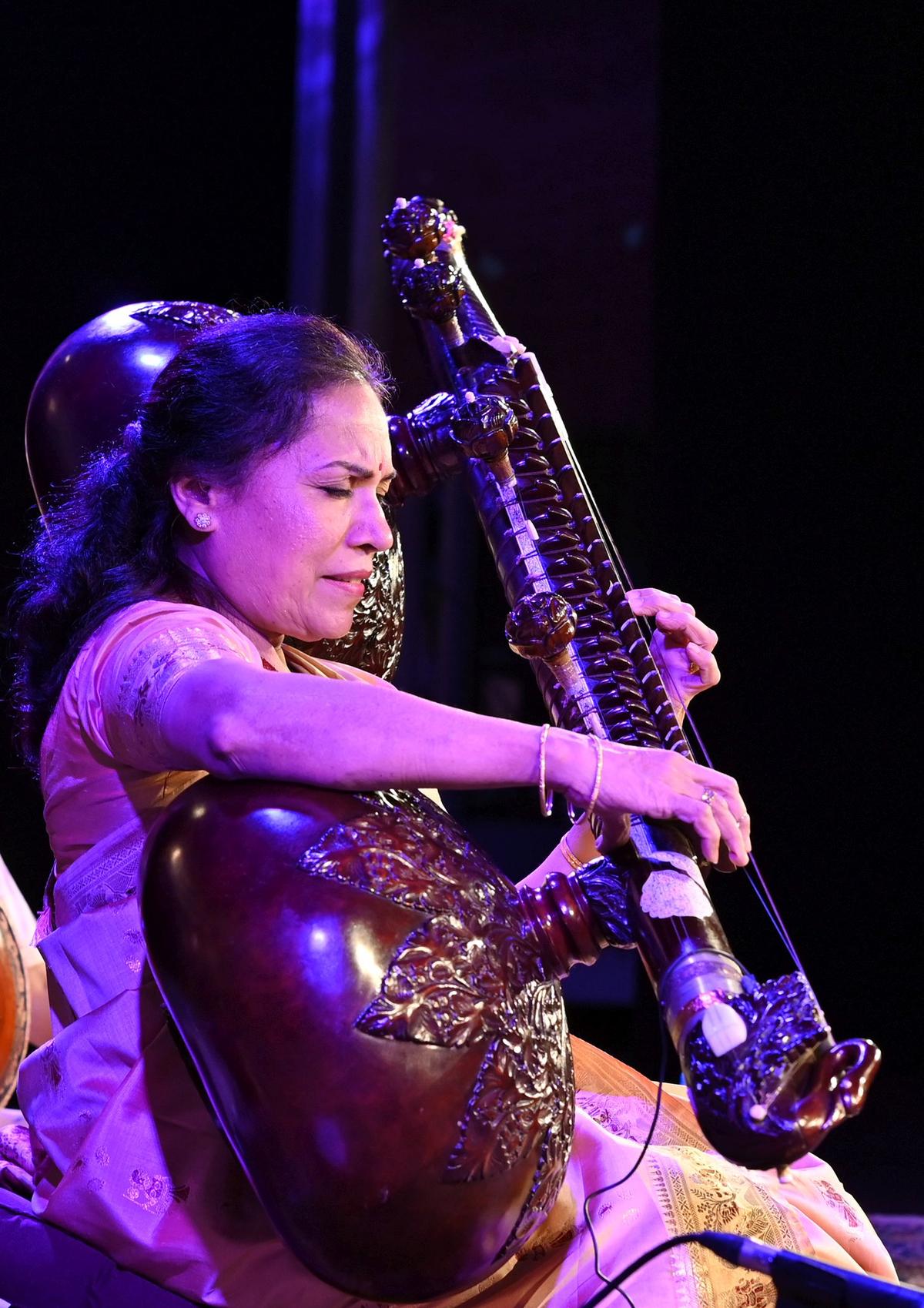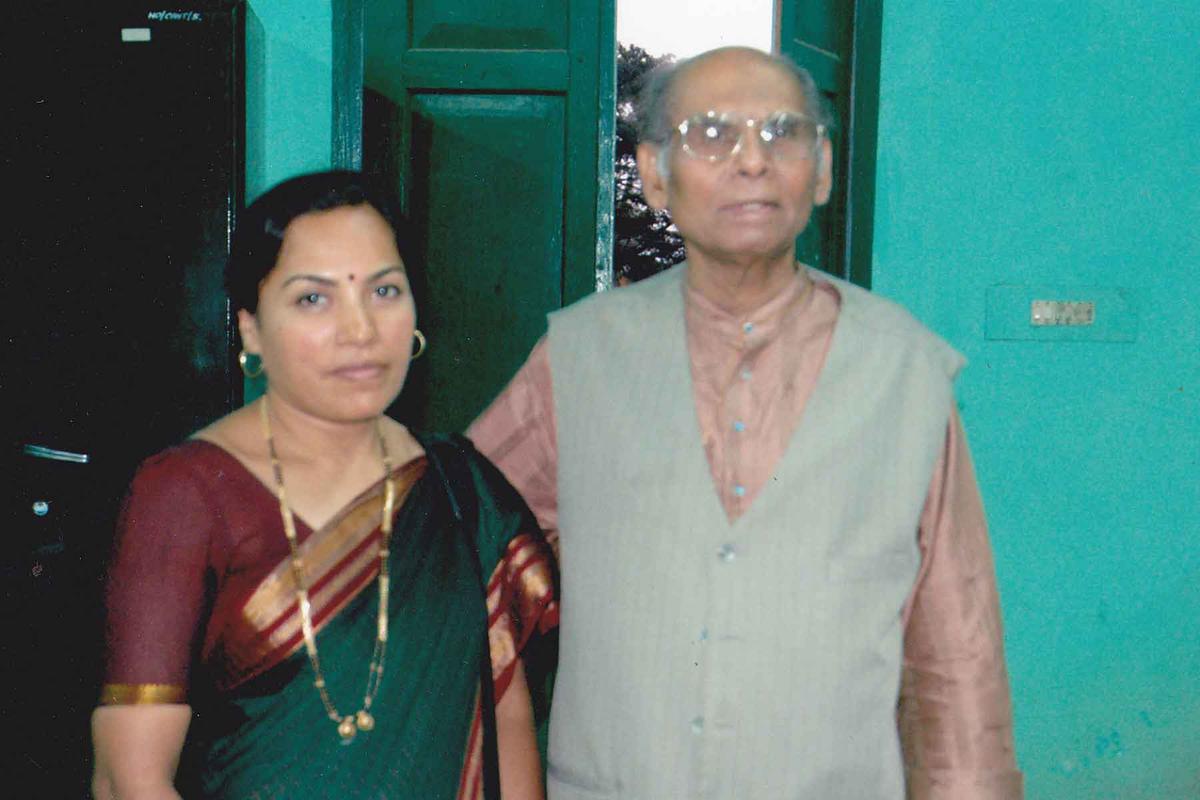
Jyoti Hegde started learning from Ustad Asad Ali Khan at the age of 35
| Photo Credit: Special Arrangement
As Jyoti Hegde sat on the stage at a recent event organised by the Sangeet Natak Akademi to celebrate World Music and International Yoga Day in Delhi, what caught the eye was the beautifully crafted instrument in her hands. It looked like the Saraswati veena. It was the rudra veena, and Jyoti Hegde is the only woman rudra veena artiste. She was an apt choice for the event because the rudra veena is the only string instrument that also requires the artiste to practise breath control. Underlining the need to do yoga, Jyoti said since the instrument is based on dhrupad, which lays importance on breath control, it is applicable to the rudra veena too. “It impacts the way the instrument is played and sound is produced.”
The ‘khandar vani’ was the original style of ‘beenkars’ or rudra veena exponents. This was the style practised by Tansen’s beenkar son-in-law, Raja Misri Chand, known as Nababat Khan in the Mughal court of Akbar. Later, Ustad Asad Ali Khan, who hailed from a family dedicated to the instrument, rose to be one of the finest rudra veena artistes. Jyoti is his foremost disciple.
The rudra veena has always had a mysticism attached to it, being taught only to a chosen few and said to be unlucky for those who did not follow the tradition when playing it. In fact, the instrument sursingar was invented in the 18th Century, to teach this style of rudra veena playing (baaj) to other string instrumentalists such as rabab or sarod.

Jyoti Hegde is the only woman rudra veena artiste
| Photo Credit:
Narendra Dangiya
At the concert, Jyoti presented raag Bairagi Bhairav. A relatively obscure raga, she learnt it not from the ustad, but from Bindu Madhav Pathak, a sitar and rudra veena exponent from Kirana gharana, under whom Jyoti initially trained. The raag was re-introduced by Pt. Ravi Shankar and is similar to Carnatic raga Revathi. Jyoti had composed a chautaal (12 beat) ‘gat’ (composition) in the raag. Serene, and meditative, Jyoti’s music never fails to soothe.
During a post-performance conversation, Jyoti revealed she did not hail from a family of musicians. When she began learning, she could not identify the difference between dhrupad and khayal, and used to play bandish on the veena. Though the ustad dissuaded her from pursuing the rudra veena, Jyoti was insistent. “When I heard the sound of instrument, I found my calling. The note resonated deep within me and I knew I had to learn it.”
Marriage and motherhood did not deter Jyoti from expanding her musical horizons. More so, since she was in Dharwad, home to many music stalwarts. She attended lec-dems by Pt. Indudhar Nirody of the Agra gharana, who helped hone her skills and made her understand why the rudra veena lent itself only to dhrupad. She was 35 then, and decided to forge ahead in her musical journey.

Jyoti with her guru, Ustad Asad Ali Khan
| Photo Credit:
Special Arrangement
Jyoti approached Ustad Asad Ali Khan. He refused to teach her since he believed that the rudra veena was not meant for women. She persisted for a year, travelling across the country to meet him at every concert of his. He finally agreed, but said she had to learn breath control, and enunciate the sound of ‘aum’ from the ‘nabhi’ (navel). “‘Only then ‘will you be able to handle the instrument’ he had said,” shares Jyoti, who took six months to achieve this. Then came the next challenge, to sit in vajrasana to play the instrument. Jyoti struggled. Finally, pakhawaj maestro Pt. Dal Chand Sharma, a friend of the ustad intervened, and the ustad agreed to teach her.
Jyoti shares how she would travel by train for two days to reach Bombay to meet her guru. “It was not at all easy. But learning from him was a memorable experience. Meals were forgotten during the class and later, he would ensure a vegetarian meal was served to me. Once, he missed his flight as he was so engrossed in teaching. When I reminded him of the time, he chided me saying, ‘focus on the music’.”
The learning lasted six years, till the demise of Ustad Asad Ali Khan in 2011. Jyoti is indebted to him for not just teaching her to play the instrument but also to understand its heritage. Today, she is the torchbearer of the style that the Ustad represented. Jyoti wants to teach young enthusiasts and pass on the tradition. Though she lives in a remote village in Sirsi district of Karnataka, she still manages to teach students from across the globe. Some of them visit her for one-on-one training, which also includes working on the farm. “Connecting with Nature can significantly enhance the learning and offer endless inspiration,” says Jyoti.
Published – July 08, 2025 02:09 pm IST


